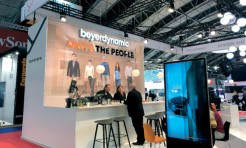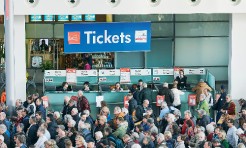90 years of UFI: Back to the future
The global association of the exhibition industry will
convene its general assembly from 4 to 7 November at the spot where it was
founded in 1925, Milan. Paul Woodward will pass on the torch to the new Managing
Director Kai Hattendorf. Both of them respond to a joint interview.

Paul, what is your assessment after five years as UFI Managing Director?
Well, I took over a completely renovated and well-positioned organisation from my predecessor Vincent Gérard. For me it was important to communicate the global profile of the exhibition industry and the great strengths of our industry. Personally, I had spent half my life in Asia, came back to Europe, and now had to take on a global perspective. This has meant that I spend a lot of time on the plane.
Kai, what challenges face the new UFI Managing Director in the next five years?
Unfortunately I have no crystal ball with which I can predict the future. Predictions can be made only for a limited period, but one thing seems certain: In the next five to ten years our industry will see faster changes than it has seen in the past 50 years. We want to provide our members with the best possible support in order to cope with this process. Personally, the new tasks will surely be tied to a noticeable increase in my long distance travel activities.
What issues should be strengthened?
Paul: Let's take digitisation. Because we are only at the beginning of the road. This does not mean that it brings an existential threat to the exhibition industry, but we need to adapt. Or we observe that, unlike before, exhibitors in Europe focus more on key markets such as Germany. Exhibitions in smaller countries need to address these questions.
Kai: Another example is human resources. Our industry has to find out how we can win young talent to work in the exhibition industry, and how to find the next generation of leadership. Or green events, which are increasingly receiving more attention.

What can the UFI do for its members in these issues?
Kai: As for green events, UFI formed a sustainability working group five years ago. It has produced very valuable insights that we have made available to our members. Other working groups have produced similar types of insights.
Paul: The ultimate aim is that our members deliver quality services at a top level. We would be happy as an association to make our expertise available. Just as important is the know-how transfer among ourselves.
So we are talking about networking; what role do UFI events play?
Kai: An extremely important one. UFI membership does not automatically bestow magical powers to its holders. It gives everyone the opportunity to get actively involved, to make contacts, and to exchange ideas. One great aspect of the exhibition industry is that on a global level we have little direct competition. The Chinese operator of an exhibition centre does not compete with his or her French colleague. Participants at UFI events are therefore very open to sharing their expertise.
Paul: Yes, for years we have been working on our formats to allow more networking. However, there must always be a middle ground, because members are different. There are those who want to maintain everything the way it is at UFI events and others who want to change everything possible. And we must not forget one thing: Our meetings are conducted in English. For 90 percent of our members English is only the second language. Therefore, not all well-intentioned interactive elements work as they do at an American association conference, where everyone communicates in their native language. That is a bit of the price that we pay for being represented in nearly all exhibition-relevant regions of the world. Asia alone supplies a third of our members.
Soon the UFI Congress will take place in Milan. What can we expect?
Paul: We are returning to our roots. Ninety years ago, in 1925, the UFI was founded in Milan. But of course this fact has only a limited value for participants. For this reason we will dedicate ourselves to future issues. The opening lecture, for example, looks at the world in 2030. And our partner Fiera Milano will offer very a practical demonstration of how to hold a sustainable conference.
Kai: We will also initiate organisational change. Previously, UFI internal meetings for working groups and the hugely popular Special Interest Groups were held on the first day and then the congress was inaugurated in the afternoon. Now we start off in the morning and in the afternoon the auditorium is dispersed – eight Special Interest Groups will convene on various topics. We believe that there is something interesting for every participant here.
What is the future of the UFI and of the medium of exhibitions?
Kai: Exhibitions will always exist in the future too, despite the shift towards digital marketing instruments. This forecast is based not least on the experience of the global economic crisis of 2008/2009. Back then, companies did cut back severely on their marketing spendings, but they stayed with exhibitions as their best opportunity to reach their customers and to interact with other players from their industries.
Paul: The UFI will not grow as fast as in the last decade, simply because most of the globally leading industry players from all around the world have joined us already. But thanks to the increasing quality of its offering it will become even more important (www.ufi.org).
Author: Peter Borstel
This article was published in TFI issue 5/2015
Share in Facebook, Twitter or Google+:
TFI - Trade Fairs International - The International Trade Fair Magazine.
© 2006 - 2024 by TFI-Verlagsgesellschaft mbH. All rights reserved. TFI-Verlagsgesellschaft mbH shall accept no responsibility for the contents of external links and other contents.
TFI-Know-how
-
What to do when things go wrong at virtual or in-person events?

In the event world, it’s simply part of life if things don’t work out as planned.
-
How can networking be made to work at online events?

Networking typically happens at real, in-person events. But it’s also possible to do it online; it just works a little differently. There are various options available to organisers.
-
How can exhibitors stand out at trade fairs?

New products and a well-conceived stand design are not the only drivers for a successful presence. Many other factors are also important, but trade fair planners often lose sight of them.
-
How can industry decision-makers be reached online?

Trade fairs and trade fair companies need to constantly further develop, become more agile and flexible and offer services all year round. New, digital offerings are very important here. With its TrustedTargeting technology, Messe München offers its customers access to leading business-to-business decision-makers on the Internet.


